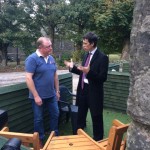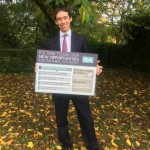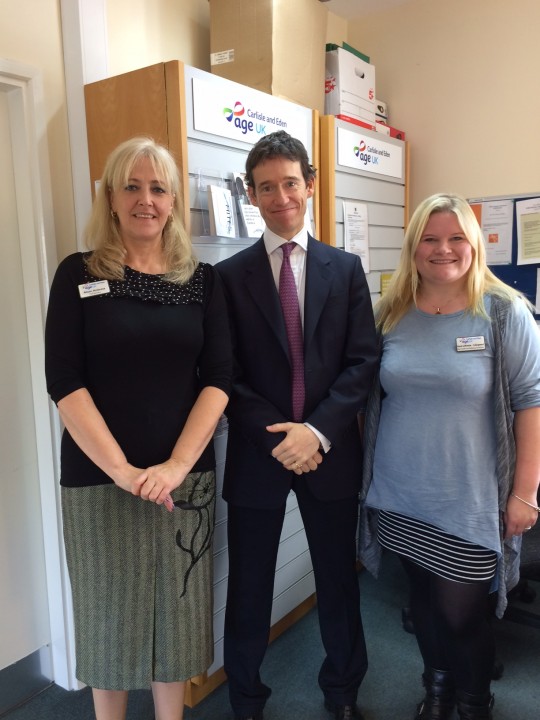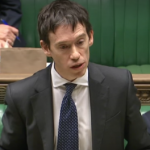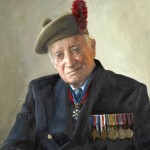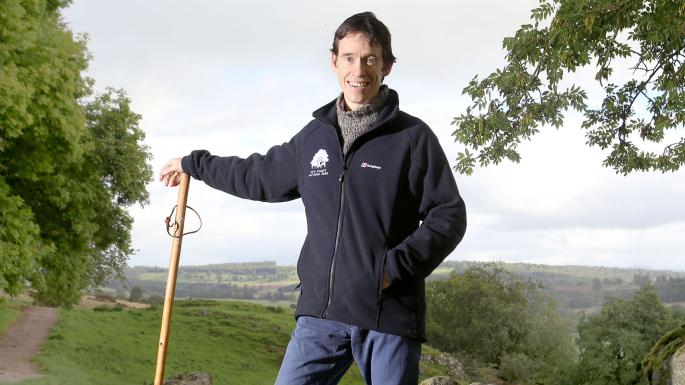
Article first published in The Times by Oliver Thring on 9 October 2016.
In November 2014 Rory Stewart delivered his son on his bathroom floor after his wife went into labour unexpectedly. Nine months later the Tory MP, author and former adventurer held his 93-year-old father as he died. Guided by paramedics on the phone, Rory had tried and failed to resuscitate Brian, a D-Day veteran who was wounded at Normandy and who became one of the most gifted British spies of the past century.
“Two accidents occurred together,” says Stewart, shoeless and beltless in the cold sitting room of his constituency cottage in Cumbria. “Within that brief period I engaged with family in a way that isn’t expected in the modern world. Normally people are born in hospital and die in hospital — they aren’t born and don’t die in a family member’s arms.”
In his new book, The Marches, Stewart describes cracking the older man’s ribs as he tried to save him. “We had been having a typical, lively conversation only 10 minutes before he died,” he writes. “I had felt good about myself for delivering the baby [Alexander Wolf] efficiently, and imagined I was good at medical emergencies. Not this time. My chest compressions had not saved my father.”
Today, sitting on an armchair with one foot pulled up in front of him, Stewart says: “That was a very odd thing for me — to have been able to deliver my son, but to have failed to save my father.”
The Marches is a meditation on Brian’s remarkable life, on Scottish and English nationalism and history and identity in the Borders. In 2011 the two men set out on a walk along the length of Hadrian’s Wall. “I had a series of grand ideas that it would be an opportunity to discuss Rome and borders and empire and nationalism,” says Stewart, who speaks for the first 20 minutes of our interview without opening his eyes. “Whereas he just wanted to spend time with his son. It was almost a comedy of endless misunderstanding, the disappointment of realising our differences.”
The 43-year-old divides opinion. To his detractors he is an insufferably pretentious and grandiose throwback to a vanished imperial Britain. Cruelly they nickname him “Florence of Arabia”. Others acknowledge his extraordinary achievements, charisma and diplomatic skill. In an era of professional politicians who say nothing controversial, the exotic, reflective and candid Stewart is an anomaly.
Until recently Stewart had been living one of the most remarkable lives of his generation, consciously mythologising himself, modelling his existence on ancient heroes and Victorian adventurers. “My father wasn’t really bringing me up for the modern world,” he admits. Does he wish he had been born in another century? “I used to.”
Born in Hong Kong, by his early thirties he was the deputy governor of two provinces in Iraq. “An American colleague became furious with me,” he says. “She said she hated watching me. I was wombling around as if it was completely natural to be the governor, holding meetings with tribal chiefs, sorting out civil wars, going out on the roof when people were shooting at us, feeling completely confident and at ease.”
By that stage Stewart had been to Eton and Oxford, joined the Black Watch (his father’s regiment) and then the Foreign Office. He is thought by some to have spied in Indonesia and Montenegro in the late 1990s: he tends to dodge questions about that period, but has admitted his CV “might give that appearance”.
Most memorably, between 2000 and 2002 he walked 6,000 miles across Asia, including a month in Taliban-controlled Afghanistan, where he was briefly captured. Hardened mercenaries had informed him he was certain to die but, swathed in traditional costume and carrying his iron-tipped bamboo dang — he poses with it, steely-eyed, for the photographer — he was gripped by the Arabic notion of kismet, or fate.
His books about the walk and his time in Iraq became bestsellers, feted by Hillary Clinton, among others. Soon afterwards Prince Charles asked Stewart to found a charity in Afghanistan, which he did, raising more than $25m to regenerate the country’s traditional crafts. (He met his wife, Shoshana, now the charity’s chief executive, when she was married to another of Stewart’s employees.)
And then he became a Harvard professor. In 2008 Brad Pitt bought the rights to make a film of Stewart’s life. You can see why some people despise him.
But something has changed in Stewart since he entered parliament in 2010. “When I was a single young man I was interested in my grand legacy. But I have found that you can sustain a desire for heroic action for only so long.
“If you look at all the Romantic poets, or all world-historical figures, really, they’re dead by their mid-thirties. It’s probably a combination of experience, world-weariness and some biochemical change in your body. One senses that poor Alexander the Great, had he lived beyond 32, would have found himself in a very perplexing situation.”
What has perplexed Stewart, meanwhile, is closer to home. As we talk, Wolf, who is now nearly two, totters in. “Having a little person has made me take myself less seriously,” he says. Without pausing, he lifts the boy onto his lap and starts stroking his hair. “He’s the one who makes me think those things were ridiculous. I’ve come to realise that whatever I am is just that.” The toddler suddenly shifts, banging his skull against Stewart’s mouth. “Oh my God, I’m so sorry,” he whispers. “Did I put my tooth in your head?”
Is he disappointed to see his younger self as ridiculous? “The question you’re asking is unanswerable,” he replies. “What on earth is the purpose and meaning to any of our lives? The problem with my earlier self is that I was trying to create grand events, whereas I think almost certainly the value of life, insofar as there is one, is located in the present.
“What stops me sleeping at night is if I think I’ve been vain, bad-tempered, insecure, unfair to someone at work, not entirely honest. That matters more than how someone is going to see me after I’m dead.”
I am not sure I quite believe him. His comprehensive and diligently maintained Wikipedia page says, with a sense of obligation, “Stewart’s policy focus in his constituency has been on broadband, mobile coverage, rural services and agriculture.” And his book is, in part, a love letter to the good voters of Penrith and the Border. But it is clear he still maintains far more ambitious plans, and much grander visions, than 4G provision and sheep-dips. He conceptualises the Britain he wants to create — possibly single-handedly — “1,500 years from now”.
“In Afghanistan it was easy to ask what people needed — water, electricity, a clinic, a school, paved roads — and deliver those things. The question of what Britain needs, as a country at the prow of history, is much more interesting and difficult. My gut instinct is that we need to rediscover certain things that politicians are understandably reluctant to talk about.” He numbers them on his fingers. “History, tradition, beauty, landscape, a sense of adventure in individual lives, a sense of a nation, a positive pride.”
At Eton, Stewart would annoy the other boys by speaking in perfect paragraphs; he forced himself to insert ums and ahs into his speech. “What worries me,” he says, “is the growing sense of isolation, despair, dislocation, loneliness in the British people. And these problems are getting worse.” It is an argument that his new boss, Theresa May, might prefer him not to make.
He had voted Labour all his life and been a party member in his teens, before he joined the Tories. Stewart was a passionate “remainer”, just as he argued strongly for Scotland to stay within the UK. “The ‘remain’ campaign was run on the assumption that the only thing the public cared about was economics,” he says. “The ‘leave’ side knew the public cared about identity and patriotism much more. It gives the lie to Bill Clinton’s old slogan, ‘It’s the economy, stupid’.”
Stewart used to advise Hillary on Afghanistan, but says they have not spoken “substantively” for three years. Is he worried about the prospect of President Trump? “No. One of the great things about mature democracies is that checks exist on power. President Trump may find it no easier to get things done than Jim Hacker does in Yes, Prime Minister.”
How does he explain Trump’s success? “The American public, like the British, is fed up with people who are too careful in what they say. A lot of Trump’s supporters probably feel they don’t agree with everything he says, but they have a sense of who he is.” Does Hillary have a problem in that respect? “Evidently.”
Part of the reason he misses his father so much is that the older man had guided him through his career. “If I had an anxiety at work or wasn’t getting somewhere with a bureaucratic thing, here was an immensely wise person who always had the answers.”
Many sons idolise their fathers, although perhaps few do well into adolescence. Stewart is unabashed discussing his love for “Daddy”. “I projected on him everything that I thought a man should be,” he says. “Normally fathers think their sons are just like them. They find it difficult to give them space to be an individual. In our relationship it was the other way round. Because of everything he had achieved, I retained for a long time an almost childlike vision of this perfect image of a man.”
When Stewart was a boy Brian would wake him at 6am to practise fencing in Hyde Park. They built rafts together in Malaysia. In his last years, Brian called Rory his “only friend”.
“Being with my father when he died was immensely helpful,” says Stewart. I would have felt a real sense of loss had I not been with him at his end. Losing a father is a terrible thing. But from my point of view it couldn’t have been better.”




